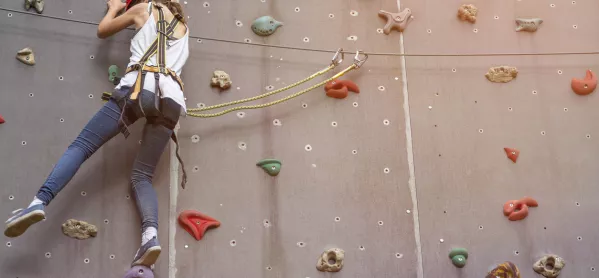When I think back to my toughest years in teaching, when high levels of anxiety were the norm, I can remember very little from my own life.
There are shadows of memories, lurking in a grey mist, but they’re all related to school.
There’s no hint of a personal life, because I didn’t make time for one. I had too many books to mark, plans to re-jig and emails to send.
Until one Friday night, I found myself coaxed into a Brazilian jiu-jitsu class - a martial art that focuses on ground fighting and grappling. Crikey!
Socially awkward, non-athletic and lacking in common sense as I was - as I am - I was completely and utterly out of my comfort zone.
And I loved it.
These sweaty, gruelling therapy sessions became the highlight of my week; a visceral reminder that I was indeed a person, not just a cog in the machine.
Whatever your version of this might be, whether it’s the electric violin, Spanish cookery lessons or painting, perhaps it’s time to take that first step towards it - it will ease stress and maybe even make you a better teacher.
1. It’s better than numbing
When stress is persistent and pervasive, “switching off” becomes a method of self-protection, a coping mechanism. The problem is that we can’t numb discriminately.
If we stop paying attention to the bad stuff, we miss the good stuff too.
Jiu-jitsu for me was so far out of my comfort zone, knowledge base and skill-set that I literally had nothing to call upon. I was starting from scratch - a beginner - and yes, it was daunting, especially as I’m used to playing the role of teacher, not student.
But it’s because of this that I had to pay attention. To ask. To learn. To listen.
What we’re talking about here is a means of tuning out work, without tuning out life along the way.
2. It builds curiosity, motivation and identity
As much in that no two school days are never the same, we frequently encounter the same problems and develop a tolerance for the ridiculous. We become jaded.
Contrarily, when we’re trying something new and different, we can’t plan out what will happen in a series of bullet points. Instead, we have to follow our own interests, likes, curiosities and motivations.
Awoken from our fugue state, we become more curious about people, situations and who we are, underneath the job.
Plus, the more curious you become, the more you notice and appreciate things that would otherwise be lost in the mist.
3. Your brain needs to play
News just in - playtime isn’t just for kids. According to Dr Stuart Brown, it’s through play that adults develop social skills, problem-solving skills, creativity and, wait for it…emotional resilience.
As he puts is: “Those who play rarely become brittle in the face of stress or lose the healing capacity for humour.”
I can certainly attest to this. On the really hard weeks, when everything felt heavy and hopeless, jiu-jitsu offered lightness, laughter and ultimately something completely alien to the rest of the week.
4. And finally…
Though I want you to do this for you - not your job - it’d be remiss if I didn’t say that trying new things will make you a better teacher too.
Because while I’m not clear on the research here, I’m pretty sure that children learn and enjoy more when their teachers are people too.
Jo Steer is a former leader now working with schools as a wellbeing consultant




